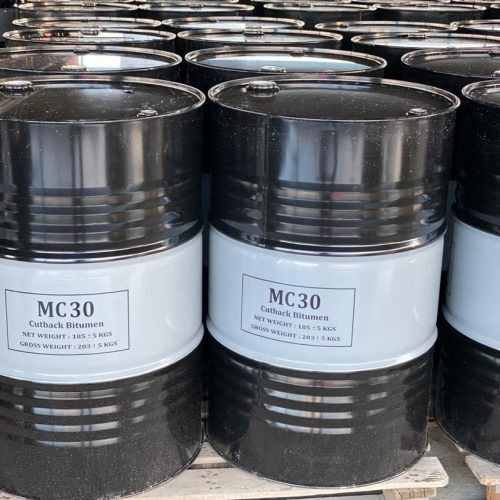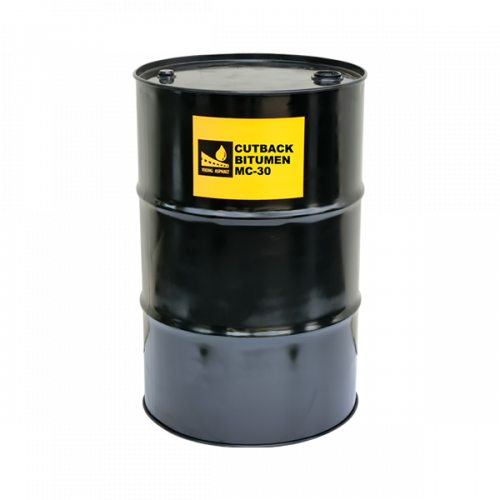- Home
- Bitumen MC30
Bitumen MC30


Bitumen MC30 can be done on original (as-supplied) asphalt binder samples (called AC grading) or aged residue samples (called AR grading). The AR viscosity test is based on the viscosity of aged residue from the rolling thin film oven test. With AC grading, the asphalt binder is characterized by the properties it possesses before it undergoes the HMA manufacturing process. The AR grading system is an attempt to simulate asphalt binder properties after it undergoes a typical HMA manufacturing process and thus, it should be more representative of how asphalt binder behaves in HMA pavements. Table 1 lists key advantages and disadvantages of the viscosity grading system.
Advantages and Disadvantages of Viscosity Grading as stated below
| Advantages | Disadvantages |
|---|---|
| Unlike penetration depth, viscosity is a fundamental engineering parameter. | The principal grading (done at 25°C (77°F)) may not accurately reflect low-temperature asphalt binder rheology. |
Test temperatures correlate well with:
| When using the AC grading system, thin film oven test residue viscosities can vary greatly with the same AC grade. Therefore, although asphalt binders are of the same AC grade they may behave differently after construction. |
| Temperature susceptibility (the change in asphalt binder rheology with temperature) can be somewhat determined because viscosity is measured at three different temperatures (penetration only is measured at 25°C (77°F)). | The testing is more expensive and takes longer than the penetration test |
| Testing equipment and standards are widely available. |
The new method of grading the product has now rested on the viscosity of the Bitumen (at 60°C and 135°C). The new grades have thus evolved with nomenclature:
| Standard | Grading based on Original Asphalt (AC) | Grading based on Aged Residue (AR) | |||||||||
|---|---|---|---|---|---|---|---|---|---|---|---|
| AASHTO M 226 | AC-2.5 | AC-5 | AC-10 | AC-20 | AC-30 | AC-40 | AR-10 | AR-20 | AR-40 | AR-80 | AR-160 |
| ASTM D 3381 | AC-2.5 | AC-5 | AC-10 | AC-20 | AC-30 | AC-40 | AR-1000 | AR-2000 | AR-4000 | AR-8000 | AR-16000 |
| Standard | Grades Minimum of Absolute | Viscosity, Poise@ 600°C | Approximate penetration grade |
|---|---|---|---|
| IS73:2013 | VG 10 | 800 | 80-100 |
| VG 20 | 1600 | – | |
| VG 30 | 2400 | 60-70 | |
| VG 40 | 3200 | 30-40/40-50 |
Viscocity grade over penetration grade several key issues are addressed, like:
Performance at high temperatures by adopting a viscosity-graded bitumen specification (based on viscocity at 60 °C), in place of the current penetration-graded specification (based on penetration at 25 °C)
Issues relating to compaction, which the tender asphalt mixtures create as push and shove under the roller wheels, have also addressed by having a requirement of minimum viscosity at 135°C, it will be helpful in minimizing the tender mix problems in the field.
Adoption of viscosity-graded paving bitumen specifications will also reduce the number of total tests to 7 Without compromising the quality of bitumen and also no new tests are required in implementing this specification.
Viscosity grades Bitumen are categorized according to Viscosity (degree of fluidity) grading. The higher the grade, the stiffer the Bitumen. In Viscosity Grade, Viscosity tests are conducted at 60°C and 135°C, which represents the temperature of road surface during summer and mixing temperature respectively. The penetration at 25°C, which is annual average pavement temperature, has been also retained in Specifications.
Viscosity Grade Bitumen Specification (ASTM D3381-09)
| Property | Units | AC-10 | AC-20 | AC-30 | AC-40 | Test Methods |
|---|---|---|---|---|---|---|
| Viscosity, 140°F (60°C) | P | 1000±200 | 2000±400 | 3000±600 | 4000±800 | ASTM D-2171 |
| Viscosity, 275°F (135°C), Min | cSt | 150 | 210 | 250 | 300 | ASTM D-2171 |
| Penetration, 77°F (25°C), 100g, 5sec, Min | 0.1MM | 70 | 40 | 30 | 20 | ASTM D-5 |
| Flash point, Cleveland open cup, Min | °C | 219 | 232 | 232 | 232 | ASTM D-92 |
| Solubility in trichloroethylene, Min | %Wt | 99 | 99 | 99 | 99 | ASTM D-2042 |
| Tests on residue from thin-film oven test: | ||||||
| – Viscosity, 140°F (60°C), Max | P | 5,000 | 10,000 | 15,000 | 20,000 | ASTM D-2171 |
| – Ductility, 77°F (25°C), 5cm/min, Min | CM | 50 | 20 | 15 | 10 | ASTM D-113 |
Viscosity Grade Bitumen Specification (IS 73:2013)
| Property | Units | VG-10 | VG-20 | VG-30 | VG-40 | Test Methods |
|---|---|---|---|---|---|---|
| Penetration at 25°C, 100g, 5sec, Min | 0.1MM | 80 | 60 | 45 | 35 | IS 1203 |
| Absolute viscosity at 60°C | P | 800-1200 | 1600-2400 | 2400-3600 | 3200-4800 | IS 1206 (Part 2) |
| Kinematic viscosity at 135°C, Min | cSt | 250 | 300 | 350 | 400 | IS 1206 (Part 3) |
| Flash point (Cleveland open cup), Min | °C | 220 | 220 | 220 | 220 | IS 1448 [P : 69] |
| Solubility in trichloroethylene, Min | %Wt | 99 | 99 | 99 | 99 | IS 1216 |
| Softening point (R&B), Min | °C | 40 | 45 | 47 | 50 | IS 1205 |
| Tests on residue from thin film oven test: | ||||||
| – Viscosity ratio at 60°C, Max | 4 | 4 | 4 | 4 | IS 1206 (Part 2) | |
| – Ductility at 25°C, Min | CM | 75 | 50 | 40 | 25 | IS 1208 |
These days, essay writing and assignment help services are highly sought-after. There are a lot of scam websites out there that promise that they will sell you essays, and then get your money. best custom writing service A lot of students steer clear of online essay services because of this. Many students are anxious about what they’ll get and want to be certain that the business is reliable.
